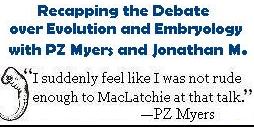 Evolution
Evolution
 Life Sciences
Life Sciences
Haeckelian Recapitulation Is Not the Issue
 This series began when ENV writer Jonathan M. asked some tough questions of PZ Myers about evolution and embryology at a Skeptics event in Glasgow, Scotland. As a recap of this series, below are links to ENV articles which have appeared on this topic:
• Part 1: Colliding With the Pharyngula: My Encounter With PZ Myers: Jonathan M. gives his firsthand account of what happened at PZ Myers’ lecture. |
PZ Myers often misconstrues intelligent design (ID) arguments about embryology by claiming we argue that modern evolutionary thinking is based upon Haeckel’s theory of embryonic recapitulation (e.g. ontogeny [i.e. development] recapitulates [i.e. replays] phylogeny [i.e. evolutionary history]). Although we do argue that textbooks should not use Haeckel’s inaccurate drawings which overstate the degree of similarity between vertebrate embryos, we recognize that the case for common ancestry no longer depends upon recapitulation theory. This is not about Haeckel’s recapitulation theory. PZ thus accuses us of knocking down a straw man. Ironically, by misconstruing our arguments and wrongly claiming that they simply entail an attack on recapitulation theory, it is PZ who sets up a straw man.
In response to Jonathan M. on embryology, PZ conflates Jonathan M.’s argument as attacks on recapitulation, writing, “MacLatchie’s response, greatly abbreviated, is to say that recapitulation doesn’t occur” and saying, “Evolution does not predict that development will conserve the evolutionary history of an organism, therefore your question is stupid.” PZ further says, “The gist of my talk was that Haeckel was wrong, that there was no recapitulation of developmental stages.”
PZ’s invectives aside, everything he says about the falsity of recapitulation theory is fine, good, and even expected from a modern evolutionary biologist. But if you watch Jonathan M.’s question, Jonathan M. says nothing about challenging Haeckel’s theory of recapitulation. Jonathan M. wasn’t claiming that Haeckel’s recapitulation theory is part of modern evolutionary biology, nor did he argue that evolutionary biology purports to conserve the evolutionary history of an organism. As Jonathan M. plainly writes in response to PZ:
For those who want the bottom line, here it is. Myers thinks I’m worried about Haeckelian recapitulation. But that’s completely wrong.
Rather, Jonathan M’s question pertained to differences between vertebrate embryos, such as “the sheer lack of correlation and congruence between homology and developmental pathways.”
Pro-ID biologist Jonathan Wells and I have made similar points on this topic which PZ has similarly ignored. As I wrote in 2007:
To avoid confusion, let me point out that we are not claiming that Haeckel’s embryo drawings and recapitulation theory are the bedrock of evolutionary biology in 2007. Nor are we arguing that every textbook that has used Haeckel’s fraudulent drawings (or some near-identical colorized version) therefore promoted the idea that “ontogeny recapitulates phylogeny.” As Jonathan Wells points out in his recent article, The Cracked Haeckel Approach to Evolutionary Reasoning, “Many modern biology textbooks inform students that Haeckel’s dictum, ‘ontogeny recapitulates phylogeny,’ has been discredited, but the same textbooks often use Haeckel’s drawings (or modern versions of them) to persuade students that human embryos provide clues to our evolutionary history and evidence for Darwin’s theory.”
PZ is correct that recapitulation theory has been discarded by modern evolutionary biologists, but Jonathan M. and other ID proponents aren’t talking about Haeckel’s theory. PZ is wrong to misconstrue our arguments as an attack on recapitulation theory.
In closing, the rejection of Haeckel’s recapitulation model by modern evolutionary biologists doesn’t mean that evolutionary biology has explained patterns of embryogenesis. As a 2011 paper in Nature Communications stated:
Although it is now widely accepted that embryogenesis cannot simply be a repetition of evolution, none of the alternative formulations has reached a consensus, even with contemporary evolutionary developmental (‘evo-devo’) theories.
(Naoki Irie & Shigeru Kuratani, “Comparative transcriptome analysis reveals vertebrate phylotypic period during organogenesis,” Nature Communications, Vol. 2:248 (2011).)
In the next article I’ll elaborate on Point 2 from my previous article.
